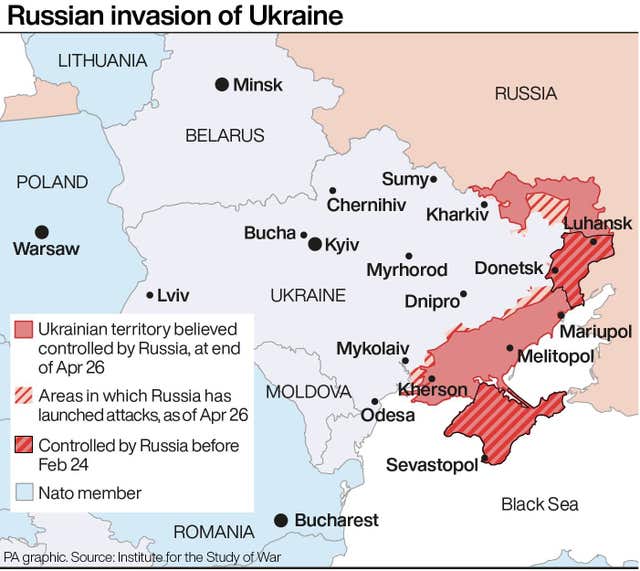Russia cuts gas supplies to Poland and Bulgaria as Ukraine conflict escalates
Gazprom said it had cut natural gas deliveries to the two EU member states because they refused to pay in Russian roubles.

Russia has cut off natural gas to Nato members Poland and Bulgaria and threatened to do the same to other countries, dramatically escalating its stand-off with the West over the war in Ukraine.
European leaders decried the move as “blackmail”.
A day after the US and other Western allies vowed to speed more and heavier weapons to Ukraine, the Kremlin used its most essential export as leverage against two of Kyiv’s staunch backers.
Gas prices in Europe shot up on the news.

At the same time, it could deprive Russia of badly needed income to fund its war effort.
Poland has been a major gateway for the delivery of weapons to Ukraine and confirmed this week that it is sending the country tanks.
Bulgaria, under a new liberal government that took office last autumn, has cut many of its old ties to Moscow and supported sanctions against Russia over its invasion.
It has also hosted western fighter jets at a new Nato outpost on Bulgaria’s Black Sea coast.
The gas cuts do not immediately put the two countries into dire trouble since they have worked on obtaining alternative sources for several years and the continent is heading into summer, making gas less essential for households.

Western leaders and analysts portrayed the move by Russia as a bid to divide the western allies and undermine their unity in support of Ukraine.
“It comes as no surprise that the Kremlin uses fossil fuels to try to blackmail us,” said EU Commission president Ursula von der Leyen.
“Today, the Kremlin failed once again in its attempt to sow division amongst member states. The era of Russian fossil fuel in Europe is coming to an end.”
State-controlled Russian giant Gazprom said it was shutting off the two countries because they refused to pay in Russian roubles, as President Vladimir Putin had demanded.
A number of other countries have also refused to do business in roubles.

Bulgarian Prime Minister Kiril Petkov called the suspension blackmail, adding: “We will not succumb to such a racket.”
On the battlefield, fighting continued in the country’s east along a largely static front line some 300 miles (480 kilometres) long.
Russia claimed its missiles hit a batch of weapons that the US and European nations had delivered to Ukraine.
Just across the border in Russia, an ammunition depot in the Belgorod region was burning early on Wednesday after several explosions were heard, the governor said.
Explosions were also reported in Russia’s Kursk region near the Ukrainian border, and in Russia’s Voronezh region, authorities said an air defence system shot down a drone.

Ukrainian presidential adviser Mykhailo Podolyak hinted at the country’s involvement in the fires, saying in a Telegram post that “karma (is) a harsh thing”.
In other developments:
– The head of the International Atomic Energy Agency, Rafael Grossi, said the safety level at Europe’s largest nuclear plant, now under Russian occupation in Ukraine, is like a “red light blinking” as his organisation tries in vain to get access for repairs.
– Just as tensions were ratcheting up, Moscow and Washington carried out a dramatic prisoner exchange, trading a Marine veteran jailed in Moscow for a convicted Russian drug trafficker serving a long prison sentence in the US.
With the help of western arms, Ukrainian forces have been unexpectedly successful at bogging Russia’s forces down and thwarted their attempt to take Kyiv.

Pro-Moscow separatists have been battling Ukrainian troops in the Donbas for the past eight years and have declared two independent republics there that have been recognised by Russia.
The US pressed its allies on Tuesday to “move at the speed of war” to ensure Kyiv remains well-supplied with the weapons necessary for that battle.
The West has also sought to isolate Russia economically, by imposing punishing sanctions.
Wednesday’s move marked marked a major economic counteroffensive by Moscow.
Poland gets around 45% of its gas from Russia but is far more dependent on coal and said it was well prepared for Wednesday’s cut-off.
Analyst Emily McClain, of Rystad Energy, said Poland has ample natural gas in storage and will soon benefit from two pipelines coming online.

Europe is not without its own leverage since, at current prices, it is paying some 400 million dollars (£319 million) a day to Russia for gas, money Mr Putin would lose in case of a complete cut-off.
Russia can, in theory, sell oil elsewhere – to India and China for instance.
But the pipeline network from the huge deposits in the Yamal Peninsula in north-western Siberia to Europe does not connect with the pipelines running to China.
And Russia has only limited capacity to export liquefied gas by ship.
Ms von der Leyen said: “The move that Russia did today is basically a move where Russia hurts itself.

European countries have struggled to reduce their dependence on Russian energy.
In Germany, known for its fine cars and its autobahns without speed limits, the auto club ADAC is calling on its 21 million members to help reduce the country’s oil imports from Russia by driving less and taking their foot off the gas.





